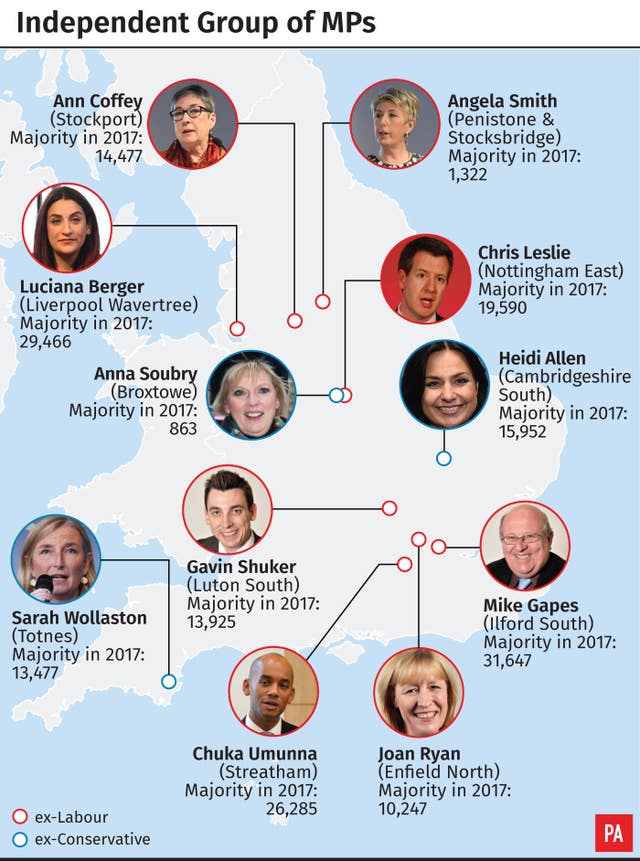Tories join breakaway Independent Group in blow to Theresa May
Heidi Allen, Anna Soubry and Sarah Wollaston have joined The Independent Group in Parliament.

Three MPs have quit the Conservative Party to join the new Independent Group (TIG) in a major blow to Theresa May’s authority.
Heidi Allen, Anna Soubry and Sarah Wollaston hit out at the Prime Minister’s “disastrous” handling of Brexit as they quit.
The three – who will join the eight ex-Labour MPs who have formed TIG – claimed Mrs May had failed to stand up to the “hard line” European Research Group (ERG) of Brexiteers.
The move poses a fresh headache for Mrs May as she prepared to face Prime Minister’s Questions in the Commons before heading to Brussels for Brexit talks with Jean-Claude Juncker.
In a letter to Mrs May, the three MPs said: “We no longer feel we can remain in the party of a Government whose policies and priorities are so firmly in the grip of the ERG and DUP.
“Brexit has re-defined the Conservative Party – undoing all the efforts to modernise it. There has been a dismal failure to stand up to the hard line ERG which operates openly as a party within a party, with its own leader, whip and policy.”
They added: “The final straw for us has been this Government’s disastrous handling of Brexit.”
Former minister Ms Soubry, the MP for Broxtowe, Health Select Committee chairwoman and Totnes MP Dr Wollaston and South Cambridgeshire MP Ms Allen said they could “no longer act as bystanders” as Mrs May continued with her Brexit strategy.
They said: “Following the EU referendum of 2016, no genuine effort was made to build a cross-party, let alone a national consensus to deliver Brexit.
“Instead of seeking to heal the divisions or to tackle the underlying causes of Brexit, the priority was to draw up ‘red lines’. The 48% were not only sidelined, they were alienated.”
They added that there was a wider dissatisfaction with the state of British politics, with both the Tories and Labour moving “to the fringes, leaving millions of people with no representation”.

They said “there will be times” when they would support the Government at Westminster “on measures to strengthen our economy, security and improve our public services”.
“But we now feel honour bound to put our constituents’ and country’s interests first.”
Mrs May said she was “saddened” by the decision but insisted that “we are doing the right thing for our country” by delivering Brexit.
She added: “I am determined that under my leadership the Conservative Party will always offer the decent, moderate and patriotic politics that the people of this country deserve.”
The resignations from the Tory benches come after Joan Ryan became the eighth MP to leave Labour for TIG.
With 11 MPs, TIG now has as many representatives in the Commons as the Liberal Democrats.
Ms Ryan fired a furious broadside at Jeremy Corbyn, accusing him of repeatedly failing to deal with anti-Semitism in the Labour Party.
“We never had this problem in the party before he was the leader. It comes with him, it is part of his politics, I am afraid,” she told BBC Radio 4’s Today.
“He has introduced or allowed to happen in our party this scourge of anti-Semitism. It has completely infected the party and at every opportunity to deal with it he has not done so.”
Ms Ryan, who has represented Enfield North since 1997, with a break from 2010-15, and served as a minister in Tony Blair’s government, also attacked Mr Corbyn’s position on the EU, claiming he was “aiding and abetting a hard Brexit”.
In an apparent response to the defections, Labour launched a consultation on changes to allow voters to force MPs to seek re-election if they swap parties.

At present, recall petitions can only be launched in a handful of circumstances, such as a serious breach of parliamentary rules or a criminal conviction. A by-election is forced if the petition is signed by 10% of constituents – usually around 7,000 people – within six weeks.
Shadow Cabinet Office minister Jon Trickett said: “Communities should not have to wait for up to five years to act if they feel their MP is not properly representing their interests, especially with the restrictions of the Fixed Term Parliament Act.”





